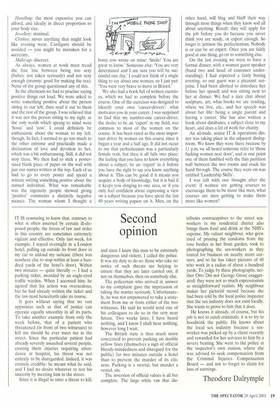Handbag: the most expensive you can afford, and ideally in direct proportion to your body size.
Jewellery: minimal.
Clothes: never anything that might look like evening wear. Cardigans should be avoided — you might be mistaken for a secretary, Make-up: discreet.
As always. women at work must tread the fine line between being too sexy (babes: not taken seriously) and not sexy enough (mumsy: good for making the tea). None of the group questioned any of this.
In the afternoon we had to practise saying positive things out loud. We were asked to write something positive about the person sitting to our left, then read it out to them and the rest of the group. I was relieved that it was not the person sitting to my right, as the only words which sprang to mind were 'bossy and 'cow'. I could definitely be enthusiastic about the woman to my left, though. In fact, I seemed to go too much to the other extreme and practically made a declaration of love and devotion to her, which was a bit embarrassing. Still, it did not stop there. We then had to stick a postersized blank piece of paper on the wall with just our names written at the top. Each of us had to go to every poster and spend a minute writing something positive about the named individual. What was remarkable was the ingenuity people showed giving 'positive' comments a distinctly negative nuance. The woman whom I thought a bossy cow wrote on mine: 'Smile! You are great to know.' Someone else: 'You are very determined and I am sure you will be successful one day.' I could not think of a single thing to say about one woman, so I just put: 'You were very brave to move to Bristol.'
We also had a book full of written exercises, which we had to complete before the course. One of the exercises was designed to identify your own 'career-drivers': what motivates you in your career. I was surprised to find that my number-one career-driver, the desire to be an 'expert' in my field, was common to most of the women on the course. It has been rated as the most important driver by women on this course since it began a year and a half ago. It did not occur to me that perfectionism was a particularly female trait, but then it all falls into place: the feeling that you have to know everything about a subject, be an 'expert' in it before you have the right to say you know anything about it. This can be good if it means you acquire a body of knowledge, but it is bad if it keeps you clinging to one area, or if you only feel confident about expressing a view on a subject because you have spent the last 80 years writing papers on it. Men, on the other hand, will Nag and bluff their way through most things when they know sod all about anything. Result: they will apply for the job before you do because you never think you are ready, or expert enough. So forget it: jettison the perfectionism. Nobody is or can be an expert. Once you are fairly good at one thing, go on to something else.
On the last evening we were to have a formal dinner, with a woman guest speaker (band two and head of customer understanding). I had expected a fairly boring evening, so our guest was a pleasant surprise. I had been allotted to introduce her before her speech and was sitting next to her at dinner. We had a nice chat about sculpture, art, what books we are reading, where we live, etc., and her speech was about her life: being a single parent and having a career. She has also written a book about databases, a subject close to my heart, and does a lot of work for charity.
An all-male, senior IT & operations dinner was taking place in the adjacent diningroom. We knew they were there because by 11 p.m. we all heard someone refer to 'those flicking women next door', and at one point one of them fumbled with the thin partition wall between the two rooms and stuck his hand through. The course they were on was entitled 'Leadership Skills'.
I was left with one thought after the event: if women are getting courses to encourage them to be more like men, what courses are men getting to make them more like women?


































































 Previous page
Previous page